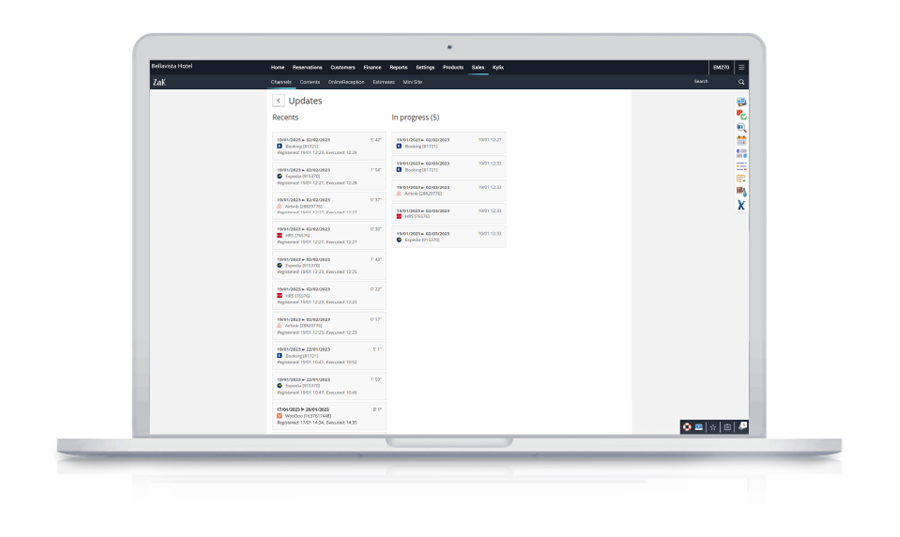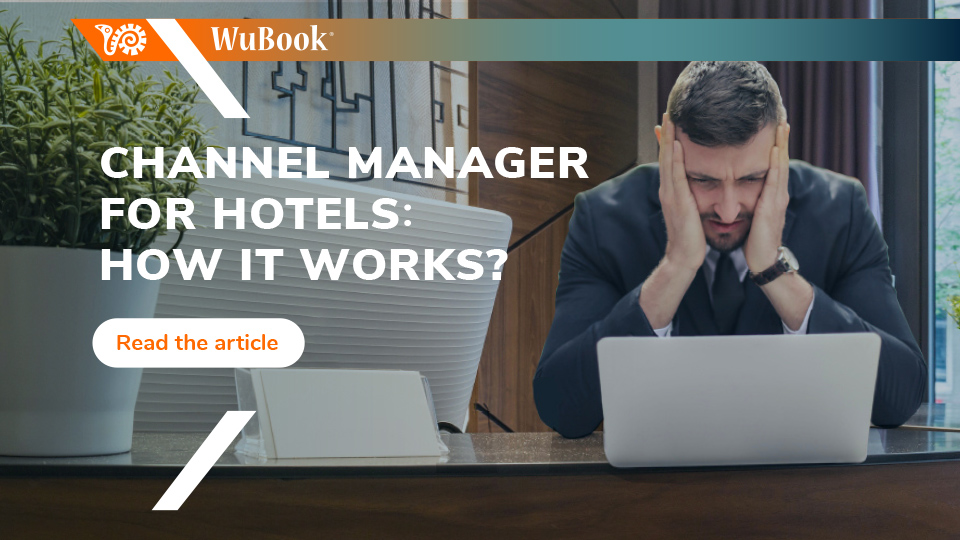Dear WuBookers,
how many of you have wondered – or are still wondering – what a Channel Manager is and how it works? If you are still in this limbo, it’s time to get clarity in order to confidently rely on this system and improve, thus, your business.
Channel manager: what it means and what it is about
Channel manager literally means “channel manager.” In fact, it is a tool, or technological solution, that allows the supply and sale of an accommodation facility’s rooms to be easily and simultaneously managed across multiple distribution channels.
By distribution channels we mean online booking platforms such as OTAs, metasearch and GDS (Global Distribution Systems). In fact, more and more travelers are resorting to the use of online portals such as Booking.com, Expedia, but also Google, which therefore have a specific weight in the economy of a hotelier and its visibility and sales strategy.
In addition to direct channels (such as the website or social media), it is necessary to activate one or more of the indirect channels to make yourself known and found by those who commonly use them.
The channel manager makes it possible to update in real time and, automatically, the availability of rooms or apartments on all the sales platforms that the hotelier or property manager has decided to connect in order to offer their property.
How does he do it?
Channel Manager: how it works
Getting down more technical, the channel manager leverages API codes that enable a two-way connection between the PMS – Property Management System or hotel management system – and distribution channels.
In other words, by connecting the PMS with the channel manager and the latter with the activated platforms, information on all channels can be synchronized.
But what information?
For example, inventory and availability of rooms. But also rates and related restrictions, including any changes in price and occupancy. In fact, the channel manager keeps track of all changes made individually or in bulk from closing a room, to updating the entire list. And, of course, reservations received from online channels, which it transmits to the PMS for it to record in the internal reservation calendar.
This allows the hotelier to always have a complete overview of the actual occupancy status of the property and sales trends, without having to manually intervene on each individual portal to update prices, availability and other details.
Assume the case of a room offered for sale on both Booking.com and Expedia or Airbnb. A user books it through Booking.com, so the room is no longer available on certain dates. The channel manager updates the new availability on all web channels. This way you won’t have to make manual changes site by site, and the risk of error or overbooking will be dramatically reduced.

Who can use the Channel Manager and when to do so?
This tool is perfect for all tourism professionals who intend to invest in multichannel promotion on an ongoing basis.
The channel manager is an easy-to-use, highly advanced and technologically powerful tool. As such, it involves a number of configurations and, therefore, activation and optimization costs, which can be offset by the opportunities offered by its use. To get the most out of this technology, it is therefore essential to structure a sales strategy that includes: defining a network of channels (OTA, metasearch, etc.) for booking, creating appropriate content for each channel, setting up a communication and marketing plan, and monitoring and analyzing results aimed at improving performance.
The channel manager also ensures a smoother sales process in other markets, but without this preliminary activity it risks being ineffective.
If, on the other hand, online distribution is very small and daily bookings are minimal, an iCal connection may be sufficient.
That being said, let’s review all the benefits that large and small hotels, vacation rentals, b&b’s, and travel agencies can gain from a good channel manager.
The benefits of the Channel Manager
A channel manager provides significant operational and economic benefits, including:
- considerable time savings: automatic updating of information and reservations, as you can imagine, reduces management time. You no longer have to access every external platform and manually change room and price availability;
- error reduction: automatic updating prevents unintentional generation of errors and inconsistencies between platforms;
- Increased profits: the ability to be present at the same time on multiple platforms allows you to increase the likelihood of booking;
- unified multichannel management: if connected to the booking engine, the channel manager can also manage sales from direct channels (the hotel site) along with the others, so you can govern everything from one place (the program dashboard);
- no overbooking: if visibility increases, the risk of overbooking, i.e., receiving more bookings than actual availability, increases. The channel manager makes it possible to manage this risk, thanks to near real-time synchronization on your own site and on OTAs ;
- revenue done right: the freedom to change rates as needed simultaneously across all sales portals allows you to make the most profit possible from your sales strategy;
- up-to-date data and statistics: whichever channel the booking comes from, the channel manager keeps the data, thus enabling the hotelier to track the most important information (guest master data, payment methods, and so on) and derive trend reports for evaluating each channel.

WuBook’s Channel Manager makes your life easier
The solutions on the market are diverse and vary in functionality, cost, and consistency with the actual needs of the facility. Zak’s Channel Manager, a hotel management system developed by WuBook, offers all the benefits listed in addition to some specific qualities.
Constantly optimized to minimize technical communication time with portals (and thus the risk of overbooking), it allows you to check the data sent to OTAs at any time. This way you always have complete control over everything and can intervene in case of errors or second thoughts.
Not only that, management is also extremely simplified: it is accessible from any device, including smartphones and tablets, and allows you to view the booking calendar in the customized mode you prefer.
You can set starting rates, diversify availability and treatments for each individual portal, and have the software automatically derive prices.
An official partner of Booking.com, AirBnb and Google, our software has more than 100 connected OTAs that it manages reliably and securely thanks in part to integration with WuBook’s Booking Engine and PMS.
Difference between channel manager, booking engine and PMS
It can happen, for those who are new to the industry or not so familiar with hotel management software, to get confused between the main tools most widely used in this field, namely channel manager, booking engine and PMS.
As we have seen so far, the channel manager allows multiple booking platforms to be administered from a single panel. The most effective way to use this tool and exploit its potential is through the Property Management System (PMS) and in connection with the booking engine.
In fact the Booking Engine allows you to transform your website into a tool suitable for reservations. With this tool, you can offer your guests the opportunity to book directly from your proprietary channel in a completely secure way and without paying intermediary costs.
The PMS or hotel management system, on the other hand, includes the entire set of tools that hoteliers and managers use to manage the day-to-day operations of an accommodation facility. Thus including, but not limited to, the channel manager and the booking engine. The PMS is also crucial for a whole other set of operations: from organizing housekeeping management, to check-in and check-out, to credit card payments, to lodging tax collection to restaurant management and beyond.
As you may have guessed, the channel manager is an essential hotel marketing tool for your business. The scope of this application is remarkable, and its implementation can make all the difference. Relying on the best service is therefore the most important step you can take.

